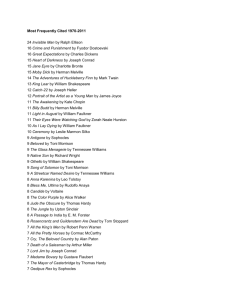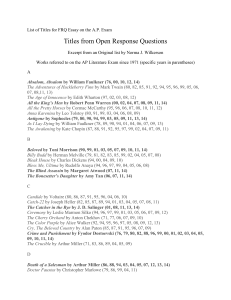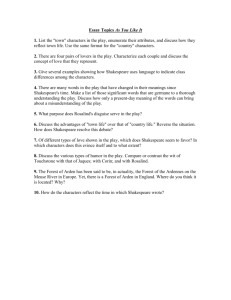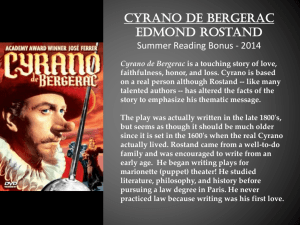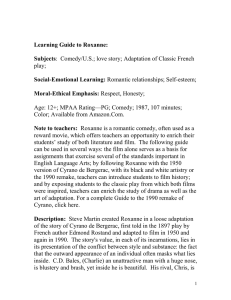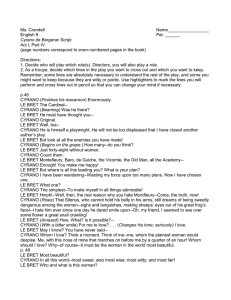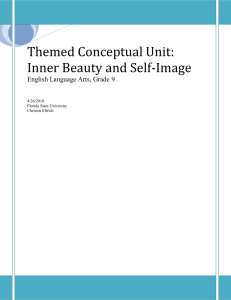Love Stories - Hong Kong Association of University Women
advertisement
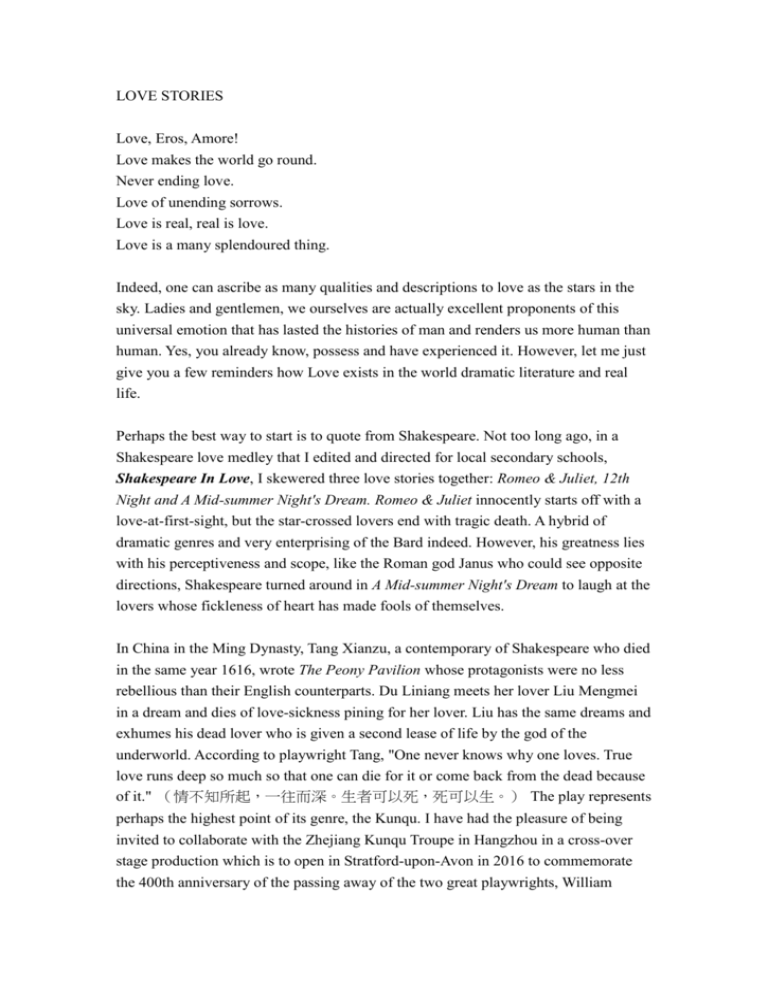
LOVE STORIES Love, Eros, Amore! Love makes the world go round. Never ending love. Love of unending sorrows. Love is real, real is love. Love is a many splendoured thing. Indeed, one can ascribe as many qualities and descriptions to love as the stars in the sky. Ladies and gentlemen, we ourselves are actually excellent proponents of this universal emotion that has lasted the histories of man and renders us more human than human. Yes, you already know, possess and have experienced it. However, let me just give you a few reminders how Love exists in the world dramatic literature and real life. Perhaps the best way to start is to quote from Shakespeare. Not too long ago, in a Shakespeare love medley that I edited and directed for local secondary schools, Shakespeare In Love, I skewered three love stories together: Romeo & Juliet, 12th Night and A Mid-summer Night's Dream. Romeo & Juliet innocently starts off with a love-at-first-sight, but the star-crossed lovers end with tragic death. A hybrid of dramatic genres and very enterprising of the Bard indeed. However, his greatness lies with his perceptiveness and scope, like the Roman god Janus who could see opposite directions, Shakespeare turned around in A Mid-summer Night's Dream to laugh at the lovers whose fickleness of heart has made fools of themselves. In China in the Ming Dynasty, Tang Xianzu, a contemporary of Shakespeare who died in the same year 1616, wrote The Peony Pavilion whose protagonists were no less rebellious than their English counterparts. Du Liniang meets her lover Liu Mengmei in a dream and dies of love-sickness pining for her lover. Liu has the same dreams and exhumes his dead lover who is given a second lease of life by the god of the underworld. According to playwright Tang, "One never knows why one loves. True love runs deep so much so that one can die for it or come back from the dead because of it." (情不知所起,一往而深。生者可以死,死可以生。) The play represents perhaps the highest point of its genre, the Kunqu. I have had the pleasure of being invited to collaborate with the Zhejiang Kunqu Troupe in Hangzhou in a cross-over stage production which is to open in Stratford-upon-Avon in 2016 to commemorate the 400th anniversary of the passing away of the two great playwrights, William Shakespeare and Tang Xianzu. In this proposed cross-over work, excerpts from Romeo & Juliet will be performed side by side to scenes selected from the Peony Pavilion. Not only is it truly East meets West, but the two diametrically opposite philosophies of Life are featured. Love as a subject in drama literature is not necessarily romantic and saccharine. In the hands of Henrik Ibsen, Father of Modern Drama, Love became a powerful tool in his Problem Plays awakening humanity to its foibles. In Ghosts, Mrs Alving tries to hide the evils of her marriage and reform her philandering husband. When she fails in both, she has had to face the consequences of a broken family infested with dangers of incest and euthanasia. In A Doll's House, Ibsen took a bold step in letting the heroine, Nora, slam the door in her husband's face and walks out of the family. Mind you, this play was written in 1879 and was really the fore-runner of feminism in the world. Ibsen was criticized for scandalizing his audiences by bringing the sewer of society under the limelight. If you share this sentiment, I shall quickly turn to the romantic and the ideal. Don Quixote de la Mancha calls the kitchen maid the beautiful name Dulcinea and wants to become her knight errant. In the song The Impossible Dream that he sings to her, he aspires to the high ideal of loving pure and chaste from afar. The case of Cyrano de Bergerac's love affair with his cousin Roxanne is a little different; he is so close but yet so far. How so? As the story goes, Cyrano is afraid to show his love to Roxanne because of his ugly big nose. His comrade Christian also loves Roxanne. So, Cyrano writes love letters to Roxanne on Christian's behalf and got them married. After Christian's died in the war and Roxanne goes to live in a nunnery, Cyrano is always by her side visiting her weekly. One day Cyrano is fatally hurt and recites one of Christian's love letters to Roxanne before dying in her arms. Do you think it is too good to be true? Let me tell you a real life love story. When Gregory Peck and Audrey Hepburn were shooting Roman Holidays in 1955, rumours had it that they were romantically involved but they both denied it because Peck was already married. Eventually Hepburn married Peck's friend Mel Ferrer. As a wedding present, Peck gave her his grandmother's ring. Years passed and both Peck and Hepburn remained good friends. When Hepburn passed away in 1993, in her funeral Gregory Peck tearfully read her favorite poem, Unending Love. Later, in an auction of her belongings, Peck went and bought back his grandmother's ring. True. It is always the unconsummated love that is most heart-rending. But what if you have already got the girl? Here's another true story. Antoine de St. Exupery of The Little Prince fame was a writer, poet, philosopher, aviator and a French national hero. He was married to Consuelo Carrillo, a South American beauty of fiery temper, sharp tongue and many talents. She was his muse and he could write better under her influence. But he simply could not tolerate her Bohemian ways. Although they both had lovers, they never divorced each other. To Antoine, Consuelo was a woman he could neither live with nor without in his life. The Little Prince, the book he wrote before disappearing over the Mediterranean sky during WWII, was the love letter he wrote to his wife. This intriguing love / hate story of the St. Exuperys has inspired me to write a play called Rose Love Letters for production next September. Last but not least, I shall speak about how it feels when one is in love. Let me quote from Shakespeare's 12th Night. Viola, in disguise as an errand boy, is sent by her master Orsino to woo the lovely lady Olivia, who, in turn, falls in love with this effeminate young man. Olivia asks Viola how she would behave to win her love. Viola, with love in her heart for her master Orsino, sings the famous Willow Song: Make me a willow cabin at your gate, And call upon my soul within the house; Write loyal cantons of contemned love And sing them loud even in the dead of night; Halloo your name to the reverberate hills And make the babbling gossip of the air Cry out 'Olivia!' O, You should not rest Between the elements of air and earth, But you should pity me! Ladies and gentlemen, this was exactly what I had done to win my better half! Speech given in the 2013 University Women's Association annual dinner, on 14 December 2013




